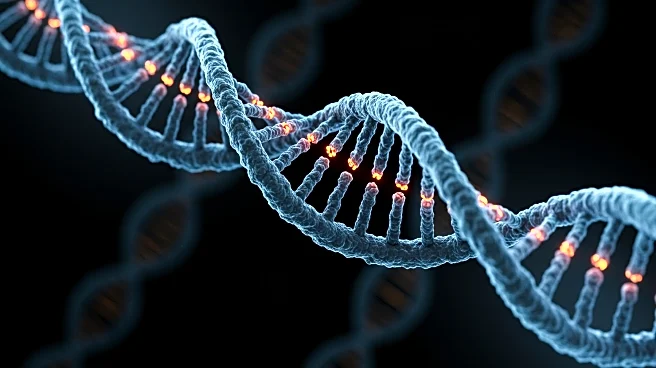What is the story about?
What's Happening?
Recent research has revealed that what was once considered 'junk DNA' in the human genome may play a crucial role in gene regulation. These DNA sequences, known as transposable elements (TEs), originated from ancient viruses and have grown to constitute over half of the human genome. Historically, scientists believed these sequences served no purpose, but new findings published in Science Advances suggest they act as genetic switches, controlling the activity of nearby genes. The study utilized a novel classification method to better understand the evolutionary relationships and preservation of these sequences, uncovering patterns of gene regulation that were previously obscured.
Why It's Important?
The discovery of the functional role of 'junk DNA' has significant implications for genetics research and the understanding of human evolution. By identifying these sequences as genetic switches, scientists can gain insights into how they influence gene expression and contribute to the complexity of the human genome. This knowledge could advance genetic editing technologies and improve our ability to manipulate DNA for medical and scientific purposes. Understanding the impact of these sequences on gene regulation is crucial for developing new treatments for genetic disorders and enhancing our comprehension of evolutionary processes.
What's Next?
Further research is needed to explore the full extent of the influence of transposable elements on gene regulation. Scientists may continue to refine classification methods to study these sequences more effectively, potentially leading to breakthroughs in genetic engineering and personalized medicine. As the understanding of 'junk DNA' evolves, it could pave the way for new approaches to treating genetic diseases and improving human health. The study's findings may also prompt a reevaluation of the role of non-coding DNA in other organisms, expanding the scope of genetic research beyond humans.
Beyond the Headlines
The revelation that 'junk DNA' serves a functional purpose challenges long-standing assumptions in genetics and highlights the complexity of the human genome. This discovery underscores the importance of revisiting scientific concepts that may have been prematurely dismissed and encourages a more nuanced exploration of genetic material. It also raises ethical considerations regarding genetic manipulation and the potential consequences of altering these sequences. As research progresses, scientists and policymakers must navigate the implications of these findings for genetic privacy, consent, and the responsible use of genetic technologies.















